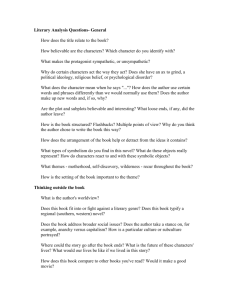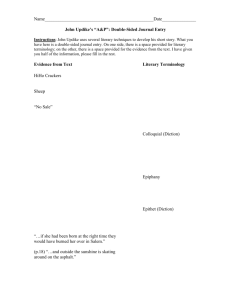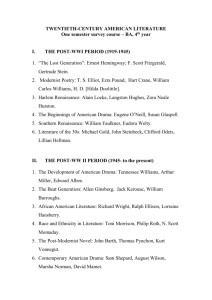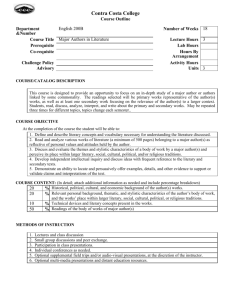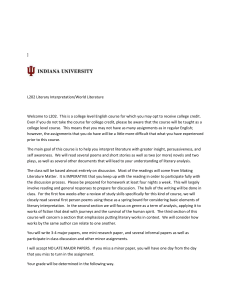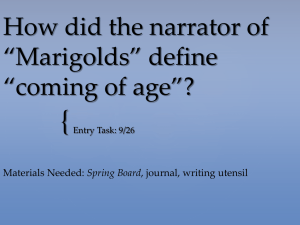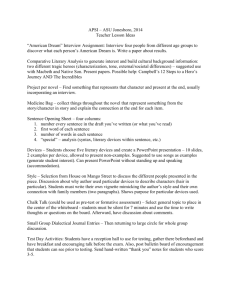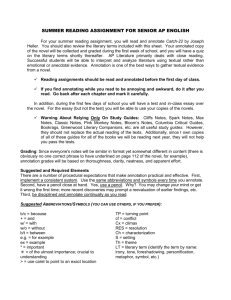ENGL150_OUTLINE_2008_Mrs. Paulino.doc
advertisement
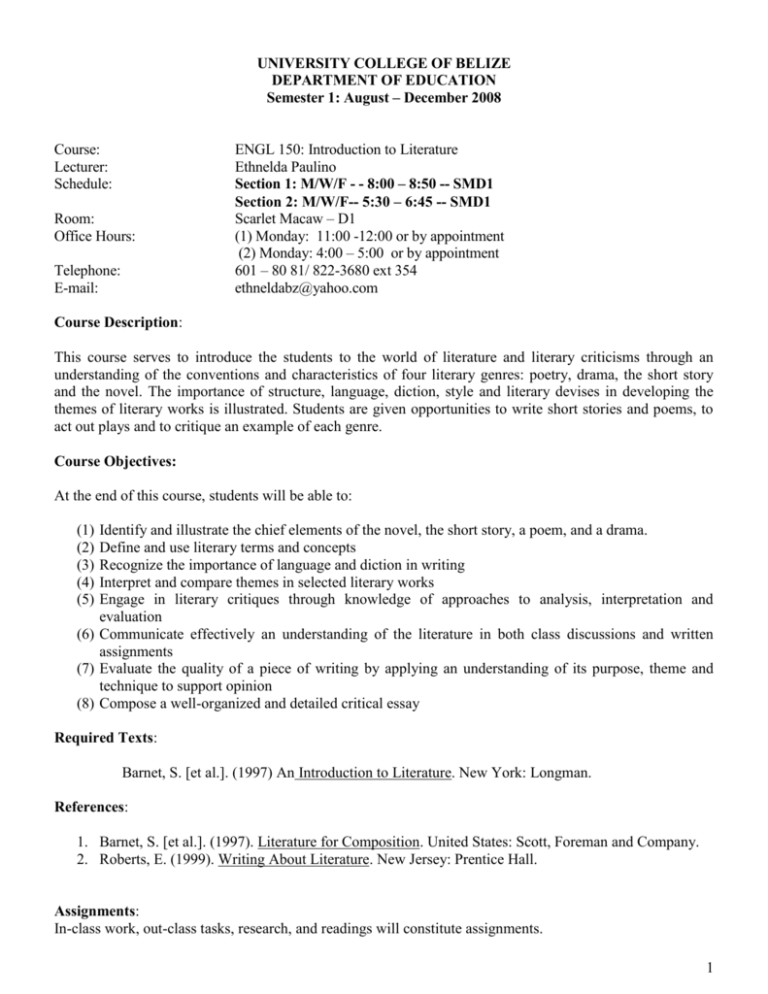
UNIVERSITY COLLEGE OF BELIZE DEPARTMENT OF EDUCATION Semester 1: August – December 2008 Course: Lecturer: Schedule: Room: Office Hours: Telephone: E-mail: ENGL 150: Introduction to Literature Ethnelda Paulino Section 1: M/W/F - - 8:00 – 8:50 -- SMD1 Section 2: M/W/F-- 5:30 – 6:45 -- SMD1 Scarlet Macaw – D1 (1) Monday: 11:00 -12:00 or by appointment (2) Monday: 4:00 – 5:00 or by appointment 601 – 80 81/ 822-3680 ext 354 ethneldabz@yahoo.com Course Description: This course serves to introduce the students to the world of literature and literary criticisms through an understanding of the conventions and characteristics of four literary genres: poetry, drama, the short story and the novel. The importance of structure, language, diction, style and literary devises in developing the themes of literary works is illustrated. Students are given opportunities to write short stories and poems, to act out plays and to critique an example of each genre. Course Objectives: At the end of this course, students will be able to: (1) (2) (3) (4) (5) Identify and illustrate the chief elements of the novel, the short story, a poem, and a drama. Define and use literary terms and concepts Recognize the importance of language and diction in writing Interpret and compare themes in selected literary works Engage in literary critiques through knowledge of approaches to analysis, interpretation and evaluation (6) Communicate effectively an understanding of the literature in both class discussions and written assignments (7) Evaluate the quality of a piece of writing by applying an understanding of its purpose, theme and technique to support opinion (8) Compose a well-organized and detailed critical essay Required Texts: Barnet, S. [et al.]. (1997) An Introduction to Literature. New York: Longman. References: 1. Barnet, S. [et al.]. (1997). Literature for Composition. United States: Scott, Foreman and Company. 2. Roberts, E. (1999). Writing About Literature. New Jersey: Prentice Hall. Assignments: In-class work, out-class tasks, research, and readings will constitute assignments. 1 Methodology: The course will be presented seminar style with students engaged in group discussions, presentations, esearch, and written assignments. Course Work Précis/summary Essay: synthesis Essay: Argument Research Paper Critical analysis Essay 2 in – class timed tests Response Journals/Reflections: on the following: Documentary or movie Short Story Play Poems Drama Novel 05 07 08 15 15 10 Final Exam 30 10 Setting Character Tone, Mood, Atmosphere Narrator—Participant/NonParticipant UB’s Grading System 95 - 100 .................... A 90 – 94 …………… A85 - 89 ...................... B+ 80 - 84 ...................... B 75 - 79 ...................... C+ 70 - 74 ...................... C 65 – 69 ...................... D+ 60 – 64 ...................... D 00 - 59 …...............… F Course Outline: Unit 1 Introduction to Literature Overview: http://www.historyworld.net/wrldhis/PlainTextHis tories.asp?historyid=aa08 Ancient World Middle Ages Renaissance Enlightenment Nineteenth Century: Romanticism, Realism, Naturalism, The New Poetry Twetieth Century: Modernism Contemporary Explorations Literary Devices Imagery: Figurative Language Writing a Summary Analysis Interpretation Discussion Evaluation Conclusion Unit 2 The Short Story Author, Title, Theme, Style Plot structure Readings: Readings: Reading and Responding to Literature: Part 1 Girl: Jamaica Kincaid 2 The Story of An Hour – pg 19 Everyday Use – pg 87 The Night Watchman’s occurrence Book: pg. 131 Writing about Literature Ch. 2 Assorted Short Stories by Belizean and Caribbean Authors Test 1 Unit 3 Drama Types of Plays Stage Direction Gestures Character: Characterization and Motivation Author, Title, Theme, Style Plot structure Setting Tone, Mood, Atmosphere Narrator—Participant/NonParticipant Language—Dialogue, Punctuation, Diction, Formality, Sentence Structure Literary Devices Imagery: Figurative Language Writing a Summary Analysis Interpretation Discussion Evaluation Conclusion Readings: The Man in a Case, pg 980…/ or selection from text by class members Assorted Plays by Belizean and Caribbean Authors Speaker of the Poem: Speaker, Voice, Narrator, Persona Audience Language: Diction and Tone Dialogue, Punctuation, Formality, Line/Sentence Structure Literary Devices Imagery: Figurative Language Rhythm Rhyme Scheme Rhymes – half, masculine, feminine, eye, end-line Form: Stanza – stanzaic patterns Sound Effects: Metrics, Meter, Metrical Feet, Metrical Lines End stop Enjambment – run-on lines Ballad: Plot structure Setting Character Tone, Mood, Atmosphere Narrator— Participant/NonParticipant Writing an Explication: line by line analysis of a poem Summary Analysis Interpretation Discussion Evaluation Conclusion Unit 4 Poetry Author, Title, Theme, Style, Structure Types of Poems: Haiku, Ballad, Sonnet, Free Verse, Blank Verse The Demon Lover – pg 646 Sonnet 116 – pg 116 Love is not all – pg 597 General Review of the Sex Situation pg 527 3 Suggested list of Poems/ selections from text by class members The Unknown Citizen -- 687 The Road Not Taken – 750 Poet to Bigot 769 Kate Chopin Unit 6 The screen play: Similarities and differences between the novel and the screen play Assorted Poems by Belizean and Caribbean Authors Poetry Presentations Unit 5 The Novel pg. 561 – Kate Chopin’s The Awakening Observations on the Novel Reading Kate Chopin’s, The Awakening Venue: Princess Hotel and Casino Final Examination Classroom Policies: Cell phones and beepers should be turned off or placed in vibrate or silent mode. Phones should only be answered in cases of emergency. Please remove hats and shades once class sessions begin No smoking in or around the classroom. There will be no make-up quizzes, class work, tests or assignments except where adequate evidence (e.g. death, a doctor’s note dated and stamped) is provided for the absence. (Lecturer decides if evidence is adequate.) No late assignments will be accepted. Plagiarism will not be excused. Plagiarized work will receive an F with no opportunity for make-up. Student Responsibilities: You are expected to: adhere to UB's policy on attendance, meet all deadlines for assignments (including assigned readings) invest thought, effort and time in each assignment to ensure quality of work participate in all class discussions and activities bring pens, pencils, whiteout, ruler, eraser, sharpener, lined paper and other necessary writing paraphernalia to class to have required texts and handouts (downloaded and printed from e-mail account) 4 have a working e-mail account *This course outline is subject to change at the discretion of the instructor in consultation with the students. Student’s Name_________________________________ Date: August 2008 Tests 10 Researched Critique 15 November ________, 2008 Presentations 15 Response Journals August: (1) September (1) October (1) Documentary or movie Short Story Poem Play Novel 5 5 5 5 10 September, October, November September___________, 2008 October __________, 2008 October __________, 2008 November __________, 2008 October __________, 2008 Test 1 September _________, 2008 Test 2 October _________, 2008 Test 3 November _________, 2008 Field Trip: November ____________, 2008 Run-through and Reading Assignments: Weekly: August to November___, 2008 Revision: November 29, 2008 5
